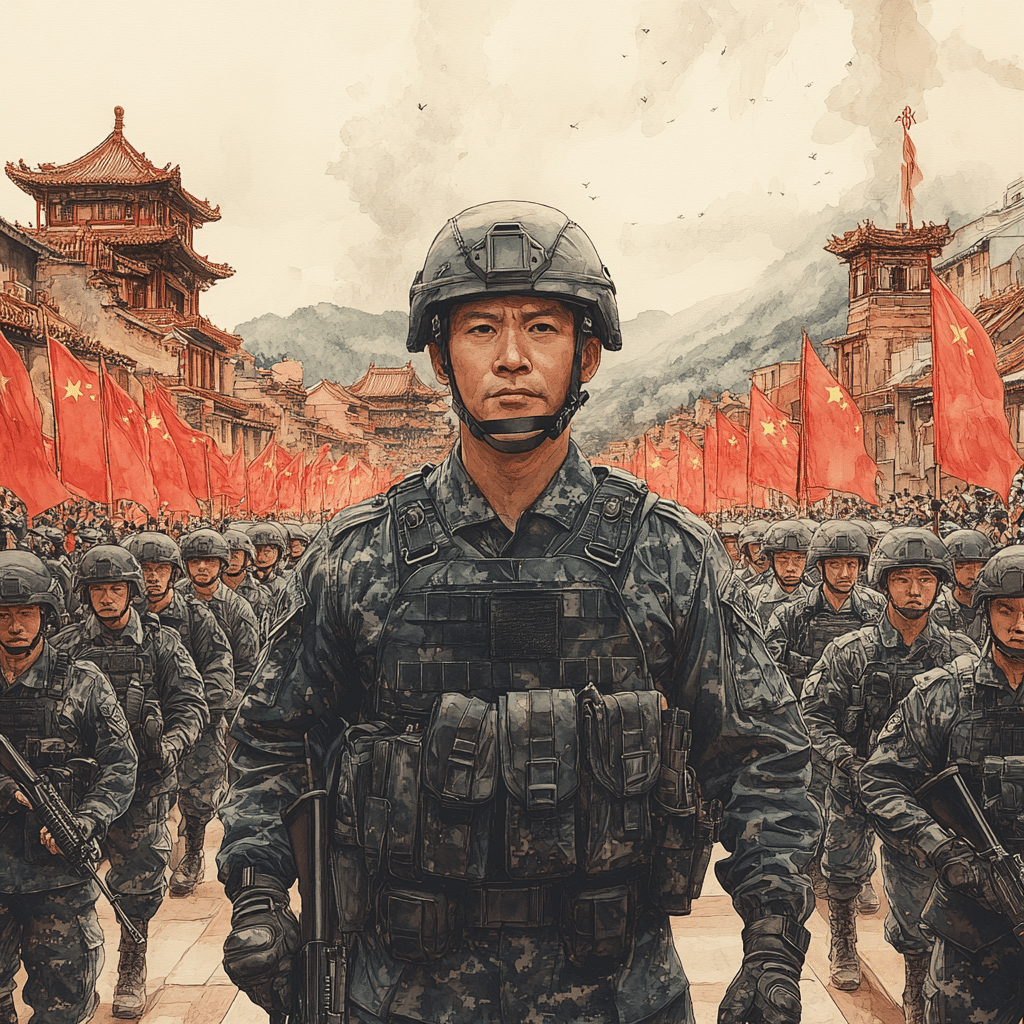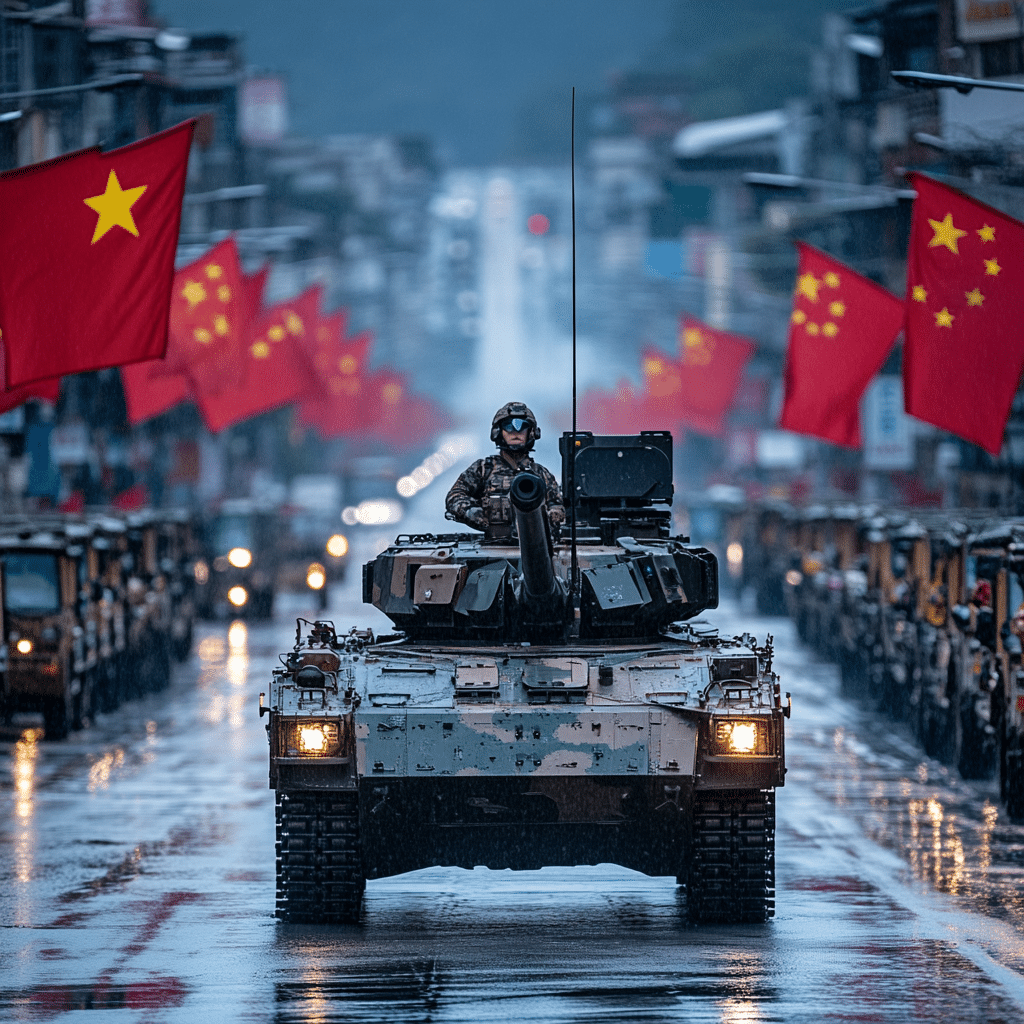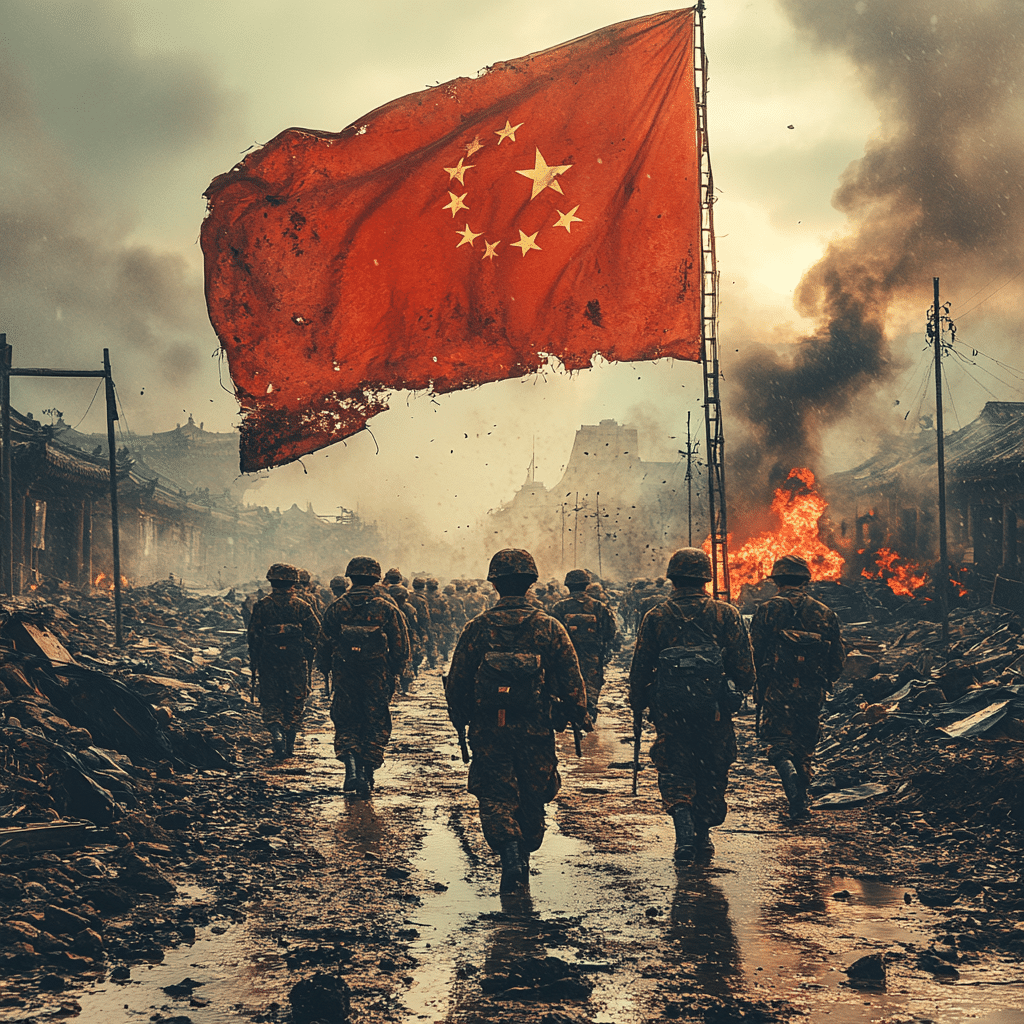As we move through 2024, there’s no denying that the Taiwan China invasion is capturing global attention. Tensions are running high, and the possibility of military conflict between Taiwan and China isn’t just a case of geopolitics gone mad; it could send shockwaves through the world economy. Experts predict that this conflict would lead to significant disruptions in markets, supply chains, and even international alliances. The world is on edge, and understanding these potential impacts is crucial for investors, businesses, and governments alike.
1. The Impending Crisis: Understanding the Taiwan China Invasion
The current situation surrounds a profound historical backdrop. Taiwan was annexed by the Qing dynasty in 1683 before being ceded to Japan in 1895 and later coming under the control of the Republic of China after World War II. Fast forward to today, we find tensions escalating as China adopts aggressive military actions against Taiwan, challenging the long-standing status quo. If Beijing opts for a full-scale invasion, expert commentators warn of dire consequences, including an “electronic shutdown,” leading to economic chaos reminiscent of the COVID-19 pandemic’s initial effects, particularly for Americans from coast to coast.
U.S. policies, like the Taiwan Relations Act, commit to providing Taiwan with defensive arms, but military and economic strategies are being re-evaluated amid this heightened intensity. What hangs in the balance is not just the stability of Taiwan but the security of global trade routes, especially in the Asia-Pacific region.

2. Top 7 Economic Impacts of the Taiwan China Invasion
2.1 Disruption of Global Supply Chains
First up in the fallout from a Taiwan China invasion is the severe disruption of global supply chains. The Taiwan Semiconductor Manufacturing Company (TSMC) produces over 60% of the world’s semiconductor chips, which are crucial for everything from smartphones to cars. An invasion would throw a wrench into this production, leading to immediate shortages. Imagine car factories across America forced to halt operations due to a lack of essential chips; that’s a grim reality businesses would have to face.
2.2 Surge in Commodity Prices
Next, the conflict could lead to a surge in commodity prices. Since China is a dominant player in the global commodities market, anything resembling military action would send ripples through prices for industrial metals and energy. Oil and copper prices might soar as investors react to potential supply shortages, leading to increased costs for consumers and businesses worldwide.
2.3 Financial Market Volatility
Historically, outbreaks of military conflict have wreaked havoc on stock markets. It’s easy to see a swift decline in major indices like the S&P 500 and Nikkei. Investors might start selling off stocks, driven by fear and uncertainty. Just picture a stock market dive similar to the one experienced during the Gulf War. The potential for a chaotic financial landscape looms large, much to the chagrin of traders and everyday investors alike.
2.4 Impact on Chinese Domestic Economy and Retirement Age
On the ground in China, the economic situation could worsen rapidly. With increased military spending, social services could take a hit, impacting ordinary citizens’ lives. Plus, there’s an ongoing discussion about changing the China retirement age given the nation’s aging population. Diverting resources to the military could inflame an already contentious debate, as funding shifts away from pensions and welfare toward defense budgets.
2.5 Dependency on Japanese Supply Chains
Japan, with its deep economic ties to Taiwan, emerges as another key player in this scenario. A closure of trade routes could severely impact industries that rely on advancements from the Japanese writing system and high-tech manufacturing. If suppliers can’t get their goods, companies will face production halts, leading to broader economic ramifications in the region.
2.6 Migratory Trends and Refugee Crises
A major fallout from the Taiwan China invasion might be a spike in migration, as Taiwanese citizens flee conflict for safer havens in neighboring countries. This movement could stress resources in countries like Japan and other Southeast Asian nations already grappling with economic challenges. Humanitarian crises often come with hefty costs, raising questions about how these societies will manage such a wave of newcomers.
2.7 The Tarkov Influence: Ground Zero Maps of Conflict
In a culturally resonant twist, the gaming community, particularly those engaged with Escape from Tarkov, finds a reflective comparison. The Tarkov ground zero map concept echoes real-world territorial disputes, revealing complex social and economic challenges. Maps like the Customs map Tarkov metaphorically depict the chaos, much like how the tides of war reshape communities and economies. This keen analogy helps illustrate the broader implications of conflict, not just as a military concern but as a sociocultural one as well.
3. The Global Response: Strategic Adjustments
Countries around the globe are adjusting strategies in light of these shifting dynamics. The United States, in response to its commitment under the Taiwan Relations Act, has ramped up support for Taiwan through arms supplies and an increased military presence. Meanwhile, European Union nations are deliberating tighter sanctions against China, balancing their economic partnerships with security needs. The actions taken by these nations will shape not only the fate of Taiwan but also the contours of global trade and cooperation.

4. Innovative Approaches to Mitigate Economic Fallout
Given these looming risks, proactive measures must be prioritized. Countries and businesses are exploring innovative strategies to mitigate potential fallout. Diversifying supply chains away from Taiwan, investing in semiconductor alternatives, and leveraging advanced technology might foster more resilient infrastructures. By thinking ahead, economies can better prepare for shocks, ensuring they retain competitive edges even amidst turmoil.
5. Wrap-Up: Bridging the Divide or Igniting Conflict?
The potential Taiwan China invasion forces us to reckon with the intricate web of global economics in times of crisis. The interconnected nature of our world means that companies and countries can’t escape the fallout of geopolitical tensions. The question remains: Will this crisis serve as a wake-up call to innovate and adapt, or will it plunge us deeper into chaos? As history reminds us, understanding the multifaceted impacts of such invasions offers not merely forewarning but also opportunities for reform and resilience in an ever-changing international landscape.
In the end, while tensions simmer, both military strategies and diplomatic maneuvers will shape the future—not just of Taiwan and China, but of economies across the globe. As we navigate these turbulent waters, it’s clear that prudent engagement and strategic collaboration could illuminate pathways toward a more stable economic future, even in the face of rising conflict.
Taiwan China Invasion: Fun Trivia and Interesting Facts
Historical Context
Did you know that the Taiwan-China showdown isn’t just a recent issue? The tension between Taiwan and China has deep roots, stretching back to the Chinese Civil War in the late 1940s. This conflict has fueled decades of political, economic, and military rivalry, which could potentially lead to a Taiwan China invasion. Much like how the lyrics from those catchy rhymes stick with us, the stakes have only intensified over time. In fact, regional dynamics today are as pivotal as a perfect hang power clean in lifting sports—it’s all about precision and strength.
Economic Implications
The global economy is like a delicate web, and any Taiwan China invasion might send ripples across it. Taiwan is crucial to semiconductor production—it’s the powerhouse driving tech advancements worldwide! Just as players in a Mets Vs Atlanta Braves game strategize to outmaneuver their opponents, countries must also plan around how this invasion could impact trade and technology. With Taiwan’s economy on the line, the butterfly effect of such military actions could lead to supply shortages and increased prices, much like how switching to Pro V1 golf Balls can improve the quality of your game, albeit at a cost.
Cultural Influence
Taiwan is rich in culture and creativity. Just picture this: the vibrant tech scene filled with innovative minds alongside the stunning visuals seen in Annasophia Robb Movies And TV Shows. If a Taiwan China invasion were to occur, the world would not only lose an economic hub, but also an artistic force. Moreover, many popular League Of Legends Characters are inspired by Asian culture, showcasing the creative exchanges that could be jeopardized.
As we reflect on the potential consequences of a Taiwan China invasion, let’s consider how technology and culture are intertwined, similar to how we learn How To turn on Apple watch to maximize everyday convenience. The interconnectedness of these elements highlights the importance of peace and stability in this region. Would humanity rather face an economic crisis triggered by conflict or cherish the culture that nurtures creativity and innovation? The choice could define our global landscape for generations.

When did China invade Taiwan?
China hasn’t officially invaded Taiwan; the situation stems from historical complexities since Taiwan was ceded to Japan in 1895 and later came under the Republic of China’s control after Japan’s surrender in 1945.
What happens if China attacks Taiwan?
If China attacks Taiwan, it could set off a cascade of severe consequences like an “electronic shutdown” and economic turmoil reminiscent of the COVID-19 pandemic, affecting not just Taiwan but also Americans everywhere.
Is China threatening Taiwan?
Yes, China is currently using military intimidation against Taiwan, escalating tensions and challenging the peace that’s been a hallmark of the Taiwan Strait for decades.
Does the US have to defend Taiwan?
The U.S. has a commitment under the Taiwan Relations Act to supply Taiwan with defensive arms and maintain the capability to counter any force that might threaten Taiwan’s security and stability.
How much would it cost China to invade Taiwan?
Experts estimate that invading Taiwan would cost China immensely, both in financial terms and through potential military losses, but exact figures are hard to pin down.
Why is Taiwan important to the world?
Taiwan is crucial to global supply chains, particularly in technology and semiconductors, and its strategic location makes it important for regional and global security.
Is war with China inevitable?
The idea of war with China isn’t set in stone, but tensions suggest that a military conflict could arise if diplomatic efforts fail.
Does the US support one China policy?
The U.S. maintains a policy of strategic ambiguity regarding the One China policy, meaning it recognizes that there’s one China while supporting Taiwan’s self-defense without formally declaring it a separate nation.
When did Taiwan separate from China?
Taiwan officially separated from China in 1949 when the Republic of China government retreated there after losing the Civil War to the Communist Party.
Does Taiwan have nuclear weapons?
No, Taiwan doesn’t have nuclear weapons; though there have been discussions in the past regarding their development, Taiwan has been under a policy of nuclear non-proliferation.
Will China surpass the US?
There are debates over whether China will surpass the U.S. in power, but economic growth and military expansion do indicate China’s increasing influence on a global scale.
Is Taiwan safe to visit?
Taiwan is generally considered safe to visit, though travelers should stay informed about the regional political situation and local safety guidelines.
How many US troops are in Taiwan?
The U.S. does not have a specific troop presence in Taiwan as a permanent stationing, but there are military cooperation efforts including training and exchanges.
Does Japan support Taiwan?
Yes, Japan supports Taiwan, especially given shared democratic values and economic ties, but support varies in terms of military commitments.
Does Taiwan have a powerful military?
Taiwan’s military is robust for its size, featuring advanced technology and a focus on defensive capabilities, making it a formidable force despite being smaller than China’s.
When did China colonize Taiwan?
China began colonizing Taiwan in the late 17th century, specifically after the Qing dynasty annexed it in 1683.
Does the US recognize Taiwan as a country?
The U.S. does not officially recognize Taiwan as a separate country but maintains unofficial relations, emphasizing support for Taiwan’s democratic government and self-defense.
Is Taiwan safe to visit?
Taiwan is generally safe for visitors, although it’s wise to keep an eye on current events and stay updated on any travel advisories.
What is China’s actual name?
China’s actual name is the People’s Republic of China.





















